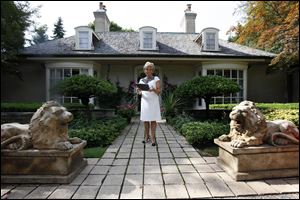
High-end houses selling fast as rest keep struggling
10/23/2011
Real estate agent Ronni Keating waits outside a home in Bloomfield Hills, Mich. In the luxury sector, the recession is a memory and prices are rising. But everywhere else, the housing market is still suffering.
In America, it's starting to feel as if there are two housing markets. One for the rich and one for everyone else.
Consider foreclosure-ravaged Detroit. In the historic Green Acres district, a haven for hipsters, a pristine, three-bedroom brick Tudor recently sold for $6,000 -- about what a buyer would have paid during the Great Depression.
Yet just 15 miles away, in the posh suburban enclave of Birmingham, bidding wars are back. Multimillion-dollar mansions are selling quickly. Sales this August were up 21 percent from the previous year. The country club has ended its stealth discounts on new memberships. And Main Street's retail storefronts are full.
"We're getting more showings, more offers, and more sales," said Ronnie Keating, a real estate agent with Sotheby's International.
In a 10-county northwest Ohio area, sales of houses priced $400,000 and higher so far this year are up 43 percent from the same period last year, according to the Toledo Board of Realtors. Sales of homes under $30,000 are up 15 percent.
Think of this housing market as bipolar. In the luxury sector, the recession is a memory and sales and prices are rising. But everywhere else, the market is moving sideways or getting worse.
In the housing market inhabited by most Americans, prices have fallen 30 percent or more since the peak in 2007. That's a steeper decline than during the Depression. Some people have had their homes on the market for a year without a single offer.
Almost a quarter of U.S. homeowners owe more on their house than it's worth. Another quarter have less than 20 percent equity. About half of homeowners couldn't get a mortgage if they applied today, Paul Dales, senior U.S. economist for Capital Economics, said.
But then there is the other housing market, occupied by 1.5 percent of the U.S. population, according to Zillow.com. The one with outdoor kitchens and in-home spas; with his-and-her boudoirs and closets the size of starter houses. The one that is not local but global, with international buyers bidding in all cash. And where the gyrations of the stock market are cause for conversation, not cutting expenses.
In this land of luxury properties, the Great Recession seems over. Prices of $1 million-plus properties have risen 0.7 percent since February, according to Zillow. Prices of houses under $1 million have fallen more than 1.5 percent.
Usually, these segments of the housing market rise and fall together. Now, they're moving in opposite directions.
"Luxury is the best-performing segment of the housing market right now," said Zillow's chief economist, Stan Humphries.
After every recession since World War II, housing has led the economic recovery. Not this time. The renewed vitality in the comparatively small market for luxury homes is not enough to power a full-blown recovery. This split in the market is another reason Michelle Meyer, chief economist at Bank of America Merrill Lynch, says her housing outlook is "increasingly downbeat."
The phenomenon is not limited to real estate. You can see the same split in other gauges of the economy. Sales at Saks versus Walmart. Pay on Wall Street versus Main Street. Corporate profits versus family balance sheets.
The divide is making credit a perk of the rich. Mortgage rates are the lowest in decades. But some people don't have good enough credit or income to be approved for a mortgage, whereas the affluent in general don't need a loan or don't have issues with getting one. Applications for new mortgages languish at 10-year lows.
Across the country, prices on high-end homes fell after the subprime crash in the fall of 2008. The price on the $25 million mansion became $20 million, then $15 million. Such "bargains" are pushing more luxury buyers to commit to more deals.
There are other factors too. In Detroit, a recovering auto industry is helping propel high-end sales. All those car executives who have helped turn around the U.S. auto industry used to rent. Now they are using their performance bonuses to buy homes.
Luxury properties are drawing buyers worldwide, said CoreLogic's chief economist, Mark Fleming.
That's true even in such seemingly all-American enclaves as Detroit. In the middle of the Detroit Metro Airport terminal sits a five-star Westin Hotel to serve the global executive class that jets in and out as the U.S. auto industry regains its footing. Many of them are buying in Birmingham, where home values are up 3.1 percent this year, according to Zillow.
In Birmingham, local store owners say business is as good as it was during the boom years last decade. Chasta Fase, who owns Old World Olive Press, a boutique shop that sells $30 bottles of olive oil from around the world, says business "has been just awesome" since she opened in November. And since April, she said, customers have been spending more than ever.
Real estate agent Ms. Keating says the same is happening to her sales. In June, she sold a lakefront mansion in Birmingham to a Russian entrepreneur, who had purchased a local steel firm that he plans to turn around.
"They're coming from all over," Ms. Keating said.